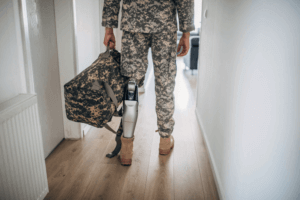An Article 32 hearing is one of the most critical stages in the military justice process under the Uniform Code of Military Justice (UCMJ). It functions as a preliminary hearing that determines whether formal charges should advance to a general court-martial, the most serious form of military trial. This process is comparable to a civilian grand jury proceeding, but with unique procedures and rights tailored to military service members.
For those facing allegations such as sexual assault, misconduct, or serious criminal offenses, understanding the Article 32 hearing process is crucial. The outcome can significantly influence whether a case proceeds to a full military court trial or is dismissed, downgraded, or resolved through non-judicial punishment.

When is an Article 32 Hearing Required?
An Article 32 hearing is mandatory before any commanding officer can refer charges to a general court-martial. Under Article 32 of the UCMJ (10 U.S. Code § 832), this hearing ensures that no service member faces the most severe form of military prosecution without a formal evaluation of the evidence.
This requirement exists to protect the rights of the accused and prevent weak or unfounded cases from reaching a military judge. If the form of the charges or the supporting evidence lacks credibility or sufficiency, the investigating officer, who presides over the hearing, can recommend against further prosecution. However, in some situations, the accused may waive the hearing entirely, typically on the advice of a defense lawyer when doing so serves a strategic purpose.
What Does an Article 32 Hearing Look Like?
An Article 32 hearing is not a trial, but it is still a formal, adversarial process. It typically takes place in a military court or designated hearing room. The hearing is led by a neutral and qualified investigating officer, usually a military lawyer who is trained in military justice and independent of both the prosecution and defense.
The hearing generally includes:
- Presentation of Charges: The prosecution outlines the allegations and details supporting the form of the charges.
- Submission of Evidence: Both sides present documents, reports, and forensic materials to a hearing officer for review.
- Witness Testimony: Witnesses are called to offer statements under oath, subject to cross-examination.
- Cross-Examination: The defense can question any witness presented by the prosecution to test credibility.
- Arguments: Both the prosecution and defense offer arguments to the preliminary hearing officer about whether the case should proceed.
After the hearing, the investigating officer submits a report that includes findings and recommendations. This report is then reviewed by the commanding officer or convening authority, who decides the next step—whether to dismiss the charges, seek administrative action, or refer the matter to a general court-martial.
Key Defense Strategies During an Article 32 Hearing
Because the Article 32 hearing can significantly impact whether a case proceeds to court-martial, it is essential to approach it with a solid legal strategy. Your criminal defense team will use this opportunity to challenge the government’s case and advocate for dismissal, diversion, or reduced charges.
1. Challenge Probable Cause
The defense counsel can argue that the prosecution (known as the trial counsel) has not established sufficient probable cause. Weak evidence, contradictory statements, or unreliable witnesses may be exposed during this phase.
2. Present Exculpatory Evidence
Providing evidence that undermines the prosecution’s case or supports innocence is crucial. This may include alibis, contradictory testimony, or physical evidence supporting an alternative narrative.
3. Discredit Witnesses
Through rigorous cross-examination, your defense lawyer may reveal inconsistencies, biases, or motives for fabrication, particularly in sexual assault cases where the testimony of the alleged victim is central.
4. Expose Procedural Errors
If investigators violated protocol, mishandled evidence, or breached the accused’s rights, this may be grounds to question the case’s validity.
5. Provide Mitigation
Even if wrongdoing occurred, showing mitigation, such as stressors, mental health concerns, character support from other military members, or lack of intent, can influence how the commanding officer or judge advocate views the case, potentially resulting in alternative handling like non-judicial punishment.
What Rights Do You Have During an Article 32 Hearing?
As a service member, you retain critical rights during an Article 32 hearing, many of which mirror those in civilian criminal proceedings:
- Right to Be Present: You have the right to attend and observe all proceedings.
- Right to Counsel: You are entitled to a military lawyer at no cost and may also retain a civilian criminal defense attorney.
- Right to Remain Silent: You are not required to testify and cannot be compelled to self-incriminate.
- Right to Cross-Examine Witnesses: Your defense lawyer can challenge testimony presented by the prosecution.
- Right to Present Evidence: You may call witnesses and submit documents to support your case.
- Right to Receive the PHO Report: After the hearing, you receive a full report summarizing the evidence and recommendations.
These rights ensure that your side of the story is heard and that no military judge ever hears a court-martial case unless the proper pretrial safeguards have been met.
Are Witnesses Required to Testify at an Article 32 Hearing?
Whether a witness must testify depends on several factors, including their status and role in the case.
– Military Witnesses
Service members who are under military authority can typically be ordered to appear and testify. This includes investigators, superiors, subordinates, or bystanders.
– Civilian Witnesses and Victims
Civilians and alleged victims, such as in sexual assault cases, cannot be forced to testify. Some may decline to participate, especially if they fear cross-examination. Their absence can impact the strength of the government’s evidence.
– Defense Witnesses
Your defense team may also call witnesses, but cooperation is voluntary unless military command involvement is possible. In some cases, expert witnesses are called to provide context, analysis, or professional insights that support mitigation or rebut the prosecution’s claims.

How The Military Defense Firm Can Help
Facing an Article 32 hearing without skilled legal support can jeopardize your future in the military and beyond. At The Military Defense Firm, we bring unmatched experience in criminal defense for service members across all branches.
Here’s how we help you navigate this critical phase:
– Dedicated Military Law Focus
Our team consists of former JAG officers and career defense attorneys with deep experience in military court procedures, including court-martial and non-judicial punishment matters.
– Strategic Preparation
We meticulously analyze the charges, evaluate the form of the charges, and prepare strong defenses tailored to your case. We understand how to navigate high-stakes allegations such as sexual assault, misconduct, or violations of the UCMJ.
– Aggressive Advocacy
We challenge unlawful investigations, confront weak evidence, and fiercely advocate on your behalf. We use the Article 32 hearing not just as a defense checkpoint, but as an opportunity to change the direction of your case.
– Full-Service Representation
From initial investigations to hearings and potential trials before a military judge, we stand with you at every step. Whether it’s helping you avoid court-martial or fighting for your exoneration, we’re committed to preserving your military career and freedom.
Schedule Your Free Consultation Today
If you’re facing an Article 32 hearing in the U.S. military, don’t wait to get the legal help you need. The decisions made at this stage can determine whether your case proceeds to trial or is resolved more favorably.
Contact The Military Defense Firm today to schedule a free, confidential consultation. Whether you’re confronting accusations of sexual assault, misconduct, or facing the possibility of separation, our attorneys are ready to defend your rights with strength and experience.
Your military service is worth protecting. Call now or complete our online form to begin your defense today.


